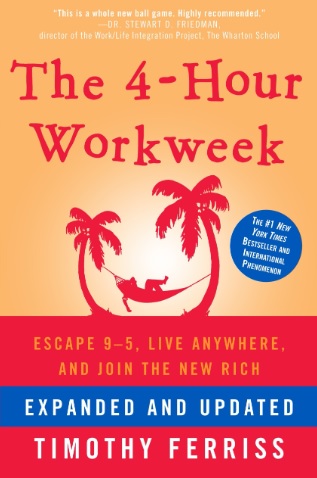If you haven’t checked out Tim Ferriss’s “The 4-Hour Work Week,” it’s well worth the read. From the title alone, you may think it’s just another get-rich-quick scheme about doing little work yet earning thousands every month. I thought the same until I read it. While I’m not working just four hours a week, the productivity lessons have streamlined my processes significantly.
Manage Your Expectations
First, it’s important to manage your expectations when you read The 4-Hour Work Week. If you work from home, you’ll likely find yourself working less each week, but very few people have actually switched from forty-plus hour weeks down to four. However, my to-do list gets done faster, and my job doesn’t bleed into my personal time like it used to. Plus, I went from doing jobs just to pay the bills to having more time than ever to take on more challenging projects that I enjoy, allowing me to earn more in less time.

Also, this isn’t a book about getting rich quick. It’s more about living a stress-free life and finally achieving a work/life balance that makes you happy.
It All Starts with DEAL
No, that’s not a typo. DEAL is Ferriss’s system for achieving a four-hour work week. The concept is simple: do the minimum amount of work necessary to achieve the best results possible.

DEAL stands for Definition, Elimination, Automation, and Liberation. Master these four things, and the way you work and even think about work will change. While I won’t get in-depth into all four, here’s a brief summary of each:
- Definition – Clearly define your goal and how much it means to you.
- Elimination – What can you eliminate that’s not important and not getting you closer to your goal?
- Automation – This covers things you can automate to help you earn income even when you’re not working. Believe it or not, there are a surprising amount of things most people can automate.
- Liberation – Discover what you really want to do with your life outside of work. It’s not about extravagant vacations, but actually finding meaning in your life.
Set Tighter Deadlines
Before reading The 4-Hour Work Week, I didn’t realize I was setting deadlines incorrectly. For instance, if I had to prepare a blog post by Tuesday, it was just another thing on my to-do list for that day. As long as I finished within my set eight-hour day, I met my deadline.
Ferriss explains that a task takes much longer when you give yourself longer to do it. A task that takes thirty minutes might take two hours if that’s the deadline you set. Now, I set much tighter deadlines. With less time to work with, I procrastinate less, ignore distractions, and write significantly faster. The same methodology applies to any job.
The 80/20 Rule for Work
If you’ve never heard of Pareto’s 80/20 rule, it’s a theory that eighty percent of results come from twenty percent of an action. It applies to a wide variety of situations. For instance, in marketing, eighty percent of sales may come from just twenty percent of marketing efforts or products.

Ferriss applies this to productivity. You give your all to the most important twenty percent of your tasks, clients, etc. By putting your main efforts here, you’re not getting worn down by the eighty percent that’s not helping you toward your goals. You’ll still accomplish everything, but you’ll finish faster and more efficiently.
Eliminate Anything that’s Not Important
Honestly, this was the hardest part for me but a valuable lesson. I had to sit down and evaluate my tasks, my clients, and everything I did throughout my workday. If you’re like me, this part will take some time.
However, I started to notice things that weren’t that important. I didn’t need to leave my email open. I didn’t need to leave my chat client open all day. Instead, I had specific windows of time where I did those tasks. I started saying no to tasks that didn’t yield maximum results.
The result: I stopped wasting time on tasks that didn’t matter that much. I wasn’t nearly as distracted. Plus, I had more time to focus on my most important tasks, which as a freelance writer, led to an increased workload from those clients.
Find Excitement in Your Work
This isn’t always possible, but it’s a valuable lesson to take away from The 4-Hour Work Week. You’ve likely heard the saying that if you enjoy what you do, you won’t work a day in your life. Ferriss endorses a similar principle. However, he throws out the theory of just doing what makes you happy.
Instead, do what excites you. Excitement increases your focus and productivity. It makes you push yourself. The goal you set for yourself should be something that excites you. And, try to find excitement in your work as well. Even if it’s just one task a day that you love, it’ll change the entire work day and make you more productive overall.
Do also check out some of the best productivity books that we recommend.

